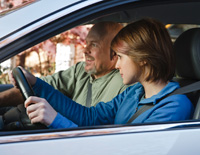Vital Signs: Teen Drinking and Driving
 Nearly one million high school teens drank alcohol and got behind the wheel in 2011. Learn the facts and find out what you can do to help keep teen drivers safe.
Nearly one million high school teens drank alcohol and got behind the wheel in 2011. Learn the facts and find out what you can do to help keep teen drivers safe.
Drinking and driving among teens in high school (aged 16 or older) has gone down by 54% since 1991. Still, high school teens drove after drinking about 2.4 million times a month in 2011, according to a recent CDC Vital Signs study.
The Problem
 Fewer teens are drinking and driving, but this risky behavior is still a major threat.
Fewer teens are drinking and driving, but this risky behavior is still a major threat.
- Drinking and driving among teens in high school has gone down by 54% since 1991. Still, high school teens drive after drinking about 2.4 million times a month.
- 85% of teens in high school who report drinking and driving in the past month also say they binge drank. In the survey, binge drinking was defined as having 5 or more alcoholic drinks within a couple of hours.
- 1 in 5 teen drivers involved in fatal crashes had some alcohol in their system in 2010. Most of these drivers (81%) had BACs* higher than the legal limit for adults.
*Blood alcohol concentration. It is illegal for adults to drive with a BAC of .08% or higher. It is illegal for anyone under age 21 to drive after drinking any alcohol in all US states.
Steps for Safety
More can be done to protect the lives of young drivers and everyone who shares the road with them.
States and communities can
- Increase awareness among teens and parents.
- Strengthen enforcement of existing policies, such as minimum legal drinking age and zero tolerance laws, and graduated driver licensing systems.
Pediatricians and other health professionals can
- Screen teens for risky behaviors, including the following:
- Using alcohol, drugs or other substances
- Driving after alcohol or drug use
- Riding with a driver who has been using alcohol or drugs
- Educate parents and teens about the risks of drinking and driving.
- Encourage parents of new teen drivers to set and enforce the "rules of the road" and consider tools like parent-teen driving agreements.
- Remind parents to lead by example as safe drivers, starting even
Parents can
 Understand that most teens who drink do it to get drunk.
Understand that most teens who drink do it to get drunk.- Recognize the dangers of teen drinking and driving and that teen drivers are at much greater risk of crashing after drinking alcohol than adult drivers.
- Provide teens with a safe way to get home (such as picking them up or paying for a cab) if their driver has been drinking.
- Model safe driving behavior.
- Consider tools like parent-teen driving agreements to set and enforce the "rules of the road" for new drivers. Safe driving habits for teens include the following:
- Never drink and drive
- Follow state GDL laws
- Wear a seat belt on every trip
- Limit nighttime driving
- Set a limit on the number of teen passengers
- Never use a cell phone or text while driving
- Obey speed limits
Teens can

- Choose to never drink and drive.
- Refuse to ride in a car with a teen driver who has been drinking.
- Know and follow their state's GDL laws.
- Follow "rules of the road" in their parent-teen driving agreement.
- Wear a seat belt on every trip, no matter how short.
- Obey speed limits.
- Never use a cell phone or text while driving.
Get your copy of CDC parent-teen driving agreement at www.cdc.gov/ParentsAreTheKey/agreement.
More Information
Get email updates
To receive email updates about this page, enter your email address:
Contact Us:
- Centers for Disease Control and Prevention
1600 Clifton Rd
Atlanta, GA 30333 - 800-CDC-INFO
(800-232-4636)
TTY: (888) 232-6348 - Contact CDC-INFO



